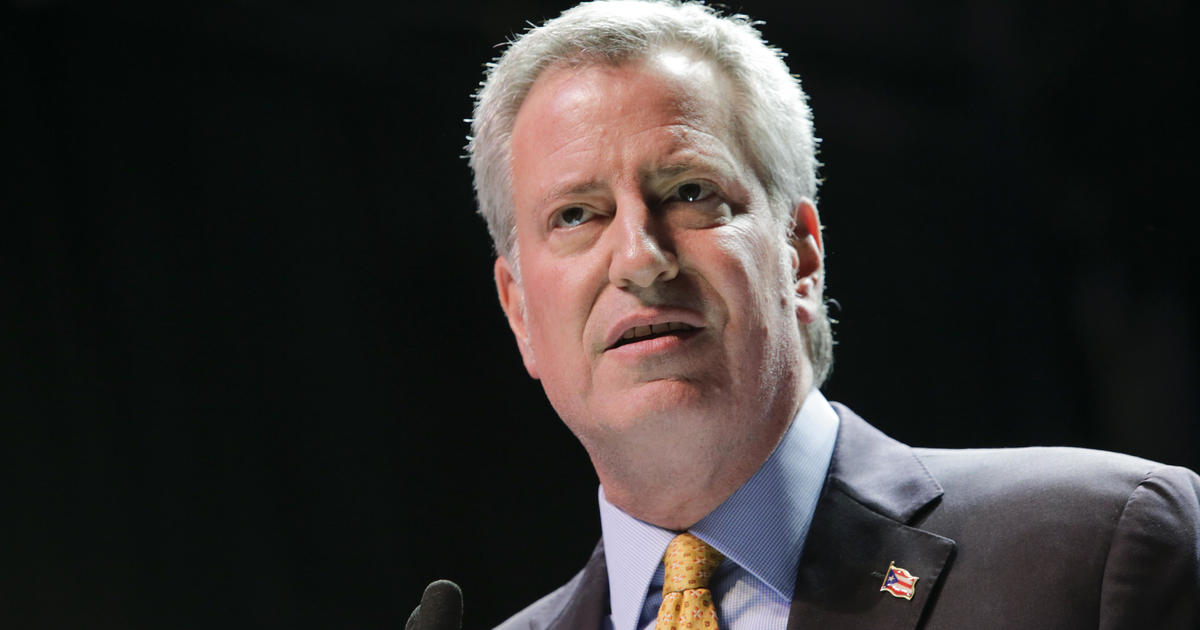
New York City Mayor Bill de Blasio has entered the presidential race, rounding the number of Democratic candidates to an even two dozen.
Mayors of the largest city in the U.S. tend not to do well on the national stage — just ask President Trump’s current lawyer and failed 2008 Republican presidential candidate, Rudy Giuliani. But de Blasio is hoping that he will be able to stand out from the myriad other contenders, and not just because he is the tallest candidate in the race at 6’5″.
His campaign slogan, “Working People First,” echoes the populist message that catapulted him to the mayoralty in 2013, when he was the clear underdog in the Democratic primary. His interracial family, which was featured in advertisements in the 2013 race, could be an asset for a white man in a race full of white men. And de Blasio does have a real, concrete progressive accomplishment implemented during his tenure: universal pre-K for all children in New York City.
Trending News
The question for de Blasio is not why he is entering the race, but why not, according to longtime New York political operative Hank Sheinkopf.
“He has nothing to lose, he has potentially lots to win,” said Sheinkopf, whose clients have included President Clinton and Michael Bloomberg, the former New York City mayor who mulled a 2020 bid. “Lightning might strike.”
After all, another unlikely contender from New York muscled his way through a large primary field to win his party’s nomination in 2016. But Mr. Trump had universal name recognition thanks to his long-running TV show “The Apprentice” and his decades as a talk show guest and tabloid fixture. De Blasio, meanwhile, has struggled to establish himself as a national progressive figure.
De Blasio’s message overlaps with many of his fellow candidates, including Sen. Bernie Sanders, who spoke at de Blasio’s second inauguration ceremony in early 2018. Christina Greer, a Fordham University professor, also argues that de Blasio’s focus on working people is similar to Joe Biden’s, but is more inclusive than the former vice president’s emphasis on the white working class.
Greer said that de Blasio could make inroads with white progressives in Iowa, and send his wife, Chirlane McCray, who is black, as a surrogate for his campaign in South Carolina. While there are 23 other Democratic candidates, Greer added, de Blasio is hoping he can edge out the “15 [candidates] who are dead on arrival.”
But aside from his numerous competitors, de Blasio also has some hurdles to overcome as he seeks the nomination. Several city agencies have been in constant turmoil during his tenure, particularly the New York City Housing Authority (NYCHA).
The commissioner of NYCHA stepped down in 2018, after it was revealed that there were dangerously high levels of lead paint in public housing, which is home to more than 400,000 low-income New Yorkers. Federal prosecutors brought a lawsuit against City Hall earlier last year, accusing NYCHA officials of deliberately covering up poor conditions in city housing. It was dropped when de Blasio and the Department of Housing and Urban Development came to an agreement earlier this year to institute a federal monitor for NYCHA.
“The housing authority and its mismanagement is a serious problem for the mayor,” said Sheinkopf. “It calls into question his managerial skills.”
De Blasio may also face questions about state and federal investigations into his campaign finances during his first term, although prosecutors never pressed charges against him. The city Department of Investigation also recently concluded that de Blasio solicited contributions from people who had business pending with the city, and the matter is currently under review by the city Conflicts of Interest Board.
De Blasio has another problem: he overwhelmingly unpopular in his own city. An April Quinnipiac poll found that he had a 42 percent approval rating, and 76 percent of New York City residents did not want him to run for president. De Blasio has been widely mocked for his some of his counterintuitive habits, such as advocating for climate change while still riding in an SUV to attend his gym in Park Slope, Brooklyn, every day.
“Some people might question, ‘Why is it the people of your city despise him so much?'” Greer said. However, de Blasio overwhelmingly won re-election in 2017, and remains popular among black New Yorkers.
“There’s this dissatisfaction with him, and still, no one ran against him,” Greer said, meaning that no one offered a credible challenge to de Blasio in 2017. Greer said there was a “disconnect” with how people see him, and his electoral victories. This could lead de Blasio to believe that the criticism of his entry in the presidential race is coming from a handful of cranks, not legitimate critics.
But his struggles during his time as mayor are unlikely to be swept under the rug, in large part thanks to the famously tenacious New York City press corps. The cover of the New York Post on Thursday showed pictures of people laughing next to the text, “De Blasio Runs for President.”
“The problem is he’s coming out of the media center of the world and everybody in the media knows him,” Sheinkopf said. “He hasn’t been very kind to the press, and they won’t be kind to him.”

